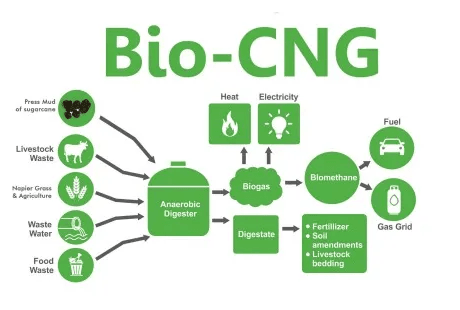In a significant stride towards sustainable waste management, the Greater Chennai Corporation (GCC) is poised to inaugurate five cutting-edge bio-CNG plants by the culmination of the calendar year.
With an emphasis on harnessing organic waste to generate renewable energy, each plant boasting a 100-tonne capacity is projected to produce a formidable 4,000 kilograms of biogas daily. This ambitious endeavour marks a substantial escalation from the existing infrastructure, with two operational plants in Chetpet and Madhavaram collectively processing 200 tonnes. Upon completion, the GCC’s aggregate production capacity is expected to soar to 700 tonnes, an impressive fraction of the city’s daily wet waste output.
By adopting an innovative approach, these bio-CNG plants not only curtail the volume of waste destined for landfills but also usher in a promising revenue stream for the GCC. Through levying a nominal royalty fee of 1.5 GBP per kilogram of biogas, alongside land rental charges, the corporation endeavors to offset operational costs while championing environmental sustainability. Anticipated to commence operations imminently, the inauguration of the inaugural plant in Sholinganallur by June 30th heralds the first phase of this transformative initiative. Subsequently, four additional plants across strategic locations including Sholinganallur (Phase II), Madhavaram (Phase-II), and Koyambedu (Phase I and Phase II) are slated for activation by December 31st.
Essentially, the bio-CNG plants function as veritable marvels of engineering, employing anaerobic digestion processes to metabolize organic waste into biogas—a potent blend of methane and carbon dioxide. The resultant digestate, a by-product of this process, holds promise as a potent fertiliser, further enhancing the circular economy ethos. In a bid to bolster uptake, GCC envisages collaborations with mid-sized and luxury hotels for biogas procurement, underscoring the multifaceted benefits of this renewable energy source. Concurrently, efforts to escalate micro-composting and vermicomposting initiatives, coupled with stringent waste segregation protocols, are poised to fortify waste management infrastructure comprehensively.
Notably, as per projections by Sandhya Strategic Investment and Advisory, a reputable waste survey firm, Chennai’s waste quantum is forecasted to burgeon twofold by 2040. Against this backdrop, imperative policies advocating for an uptick in bio-CNG processing capacity to 550 tonnes per day, alongside a concomitant augmentation of composting capacity to 1,100 tonnes by 2035, underscore Chennai’s steadfast commitment towards sustainable urban development.


